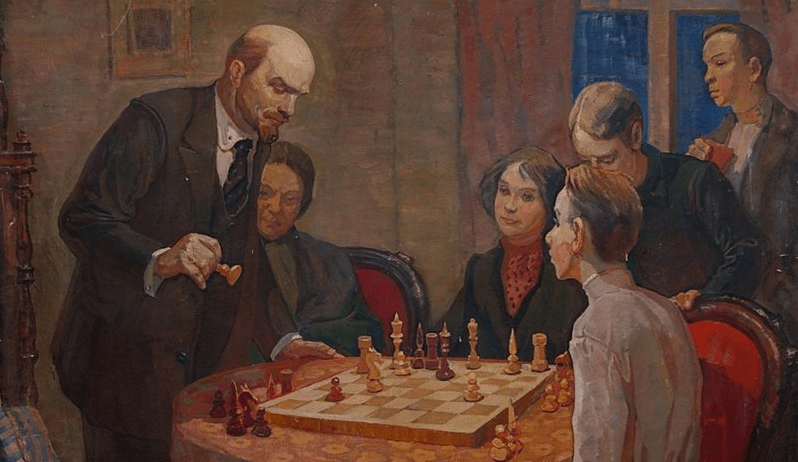In Soviet times, the winged definition of the ancient game signed by the leader of the world proletariat could be seen in almost any publication concerning chess. We checked whether Vladimir Ilyich said this.
Among the publications where this phrase was associated with Lenin, one can highlight the magazines "Change" (1951), "Neva" (1965), "Science and Life" (1984), "Socialist Labor" (1987), books by famous chess figures - "Achievements of Soviet chess culture" Yakov Rokhlina (1954), "Where the King Goes" Victor Henkin (1979), as well as an article by world champion Mikhail Botvinnik “Is chess art?” (1960). As noted sources, the corresponding poster adorned almost all chess clubs of the USSR. Writer and captain of the Odessa KVN team Valery Khait claimed, that for many years near the chess and checkers club in his hometown there was an “improved” phrase: “Chess and checkers are mental gymnastics. Lenin." And here is the diletant.media portal attributes this quote to another revolutionary figure - Felix Edmundovich Dzerzhinsky.
The blossoming of chess in the Soviet country began during Lenin’s lifetime. In 1920, during the Civil War and general devastation, he was an active participant in the storming of the Winter Palace Alexander Ilyin-Zhenevsky managed to organize All-Russian Chess Olympiad with the participation of the future world champion Alekhine, then still a Soviet chess player. In 1924, after the death of Ilyich, the former Supreme Commander of the Red Army Nikolay Krylenko founded the All-Union Chess and Drafts Section, which he headed until his arrest and execution in 1938. Even before the war, it began to become clear that Lenin was fond of a huge amount sports, and these preferences later played an important role in justifying the need to develop each specific type.
However, Lenin had a special passion for chess. The leader's brother Dmitry Ulyanov details in his memoirs described Volodya’s passion for gaming when he was a teenager and student. The future revolutionary even won an amateur tournament, among the participants was one of the strongest Russian chess players of that time - Andrey Hardin.
About another period of Lenin’s life - exile in the village of Shushenskoye - it is known that Ilyich himself cut out figures made of birch bark, and then, according to one of letters N.K. Krupskaya, “he fought chess from morning to evening and... won everyone, of course.”
Well, one of the most famous references to the leader’s game in literature is associated with the game played in 1908 at Villa Krupp on the Italian island of Capri, where Lenin came visit at the invitation of Gorky. Vladimir Ilyich’s rival was another prominent Bolshevik, Alexander Bogdanov. There is even a book dedicated to this game by István Orosz "Chess on the Island", the author of which admits that Lenin’s painful defeat could influence realpolitik and the further exclusion of Bogdanov from the Bolshevik center.

It is also impossible not to mention the scandalous appearance in 2009, at an auction in London, Emma Löwenstamm’s painting “The Game of Chess: Lenin with Hitler - Vienna 1909”, allegedly written based on a real meeting of two figures at the artist’s home. However, the painting never sold, and its entire history raises serious doubts.
As for our phrase, if we try to find it in the multi-volume collected works of Lenin or the memoirs of those close to the leader of the proletariat, the statement “Chess is a gymnastics of the mind,” we will end up with nothing. Even a phrase from a magazine that does not imply an exact quote "Under the banner of Leninism" (1985): “As Dmitry Ilyich Ulyanov recalled, chess was a kind of “mental gymnastics” for Lenin” - is not confirmed; The leader's brother did not write about anything like that. Then what's the matter?
The famous researcher of quotes Konstantin Dushenko in his article “Gymnastics of the mind, or On the benefits of lying” writesthat the corresponding slogan in the Land of Soviets appeared in the 1950s - at first it was anonymous, but 10-15 years later, for the sake of greater persuasiveness, it began to be attributed to Lenin. Here Dushenko is mistaken, because in the above-mentioned magazine “Smena” the attribution happened back in 1951. However, we should still highlight the slightly later mention of the quote in the book by Yakov Rokhlin "Achievements of Soviet chess culture" (1954), since the figure of the author, a prominent popularizer of chess in the USSR, seems to be key in the history of the quotation.
How said on the website of the Russian Chess Federation, “in an effort to promote chess, Yakov Gerasimovich was not particularly shy in the ways of achieving his goal. So, with his light hand, we got Lenin’s aphorism “Chess is a gymnastics of the mind,” which could be seen on the wall of any chess club from Moscow to the very outskirts: it was reproduced many times in all Soviet chess publications. Lenin's words had a magical effect on officials of any rank, even those who knew nothing about chess: they helped open new chess clubs and organize various competitions. However, you will not find such a statement either in Lenin’s writings or in the memoirs of the leader’s contemporaries.”
Indeed, the first more or less detailed description of the history of the appearance of the phrase appears only in 1980, in an article by the same Rokhlin in the magazine "Chess in the USSR". In it, the author claims that Lenin said these words at a meeting with revolutionary Nikolai Podvoisky in October 1920, and many years later, revolutionary Panteleimon Lepeshinsky allegedly confirmed this opinion of Lenin in a conversation with Rokhlin himself. However, the absence of a similar story in other sources, including those related to the people mentioned, makes us think that Rokhlin simply made up post-facto confirmation of that canard, one of the first authors (if not the first author) of which he became many years ago.
Finally, it should be noted that the phrase “mind gymnastics” in Lenin’s time was far from a new invention. This has been the case in Germany since the end of the 18th century. called logic, mathematics and ancient languages, that is, the basis of classical gymnasium education. In Tsarist Russia, the expression began to symbolize cramming, which was reflected in one of the poems Merezhkovsky. And already in Soviet times, a similar “Leninist” phrase “Mathematics is mental gymnastics”, supposedly spoken another prominent communist Mikhail Kalinin, played a certain role in the popularization of this discipline.
Thus, with a high degree of probability it can be assumed that Vladimir Ilyich Lenin never uttered the phrase “Chess is mental gymnastics.”
Most likely not true
Read on the topic:
1. Konstantin Dushenko. Mental gymnastics, or the benefits of lying.
2. Person of the day. Yakov Rokhlin.
3. Five quotes attributed to Lenin.
If you find a spelling or grammatical error, please let us know by highlighting the error text and clicking Ctrl+Enter.







